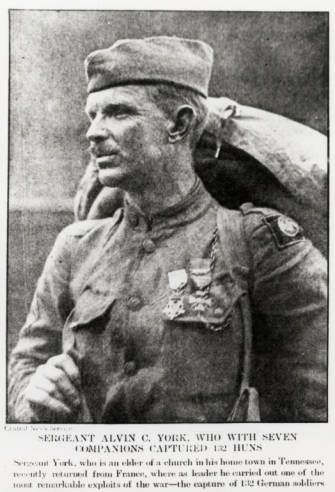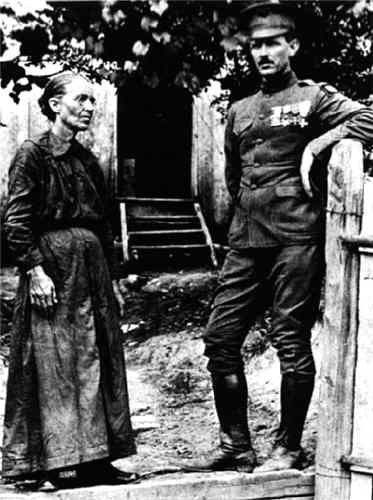Authors:
Historic Era: Era 7: The Emergence of Modern America (1890-1930)
Historic Theme:
Subject:
Fall 2018 - World War I Special Issue | Volume 63, Issue 3


Authors:
Historic Era: Era 7: The Emergence of Modern America (1890-1930)
Historic Theme:
Subject:
Fall 2018 - World War I Special Issue | Volume 63, Issue 3
Early in October 1918, the Meuse-Argonne offensive smashed into Germany’s Hindenburg line. Allies outnumbered the enemy eight-to-one but the offensive stalled. Germans had laced the Argonne Forest with machine guns. A cold October drizzle turned roads into muck. Advances expected to make eight miles a day made only three, forcing U.S. General John “Blackjack” Pershing to call a halt. For three days, troops regrouped, and officers reconsidered. When the offensive resumed, a single soldier among the 820,000 would become the most celebrated hero in American military history.
Towards noon on October 8, soldiers in the 328th Infantry were alarmed to see a hundred or more Germans striding toward them. All but a few had their arms up. Three American riflemen marched on either side, and in the lead was a lone corporal carrying an Enfield rifle in one hand and a Colt .45 in the other. Once the prisoners were corralled, the story of their capture came out.
It seemed unbelievable, impossible. The jug eared, freckle-faced corporal leading the prisoners had captured them — all of them.

When word reached the brigade commander, he approached the soldier. “Well, York,” he said. “I hear you have captured the whole damned German army.”
Corporal York saluted. “No,” he said in his Tennessee drawl, “just 132.”
In history’s long parade of military heroes, few rival Sergeant Alvin C. York. For a half-century following World War I, the name Sergeant York was synonymous with courage and duty, God and country. He was decorated with every major American medal plus France’s Legion of Honor and Croix de Guerre. Sergeant York was the subject of biographies, legends, and a movie starring Gary Cooper. He met presidents. His name graced a highway, a movie theater, buildings, and streets. Novelist Robert Penn Warren based characters on York, and when F. Scott Fitzgerald detailed Jay Gatsby’s war exploits, he set them in the Argonne Forest where Gatsby earned medals from many countries, including, like Sergeant York, one from “little Montenegro down by the Adriatic Sea.”
Yet there was a hero within the hero. Like most veterans, Sergeant York was uncomfortable when thanked, again and again, for his service. Asked to recount his heroics, he often said, “I am trying to forget the war. I occupied one space in a fifty-mile front. I saw so little it hardly seems worthwhile discussing it.” He often claimed that his most important work was in the mountains where he grew up. And when all the parades were over, all the fanfare faded, Sergeant York’s efforts to improve the life of “my people” remain his lasting legacy.
of a few houses near the Kentucky state line." data-entity-type="file" data-entity-uuid="fd1c9cf1-1c3d-45a6-8d51-5709a90ae7ad" height="452" src="https://www.americanheritage.com/sites/default/files/inline-images/Path_and_fence_going_up_to_the_cave-cropped_0.jpg" width="1142" loading="lazy">
Pall Mall, Tennessee was just a handful of cabins in a hollow when Alvin Cullum York was born there in 1887. The town, a local said, was “just as far up in the Cumberland mountains as you can get without starting back in the other direction.” Fentress County, just over the mountains from Kentucky coal country, provided a rugged living for 8,000 residents, hunters far outnumbering farmers. In a one-room schoolhouse, a single teacher taught 100 kids. With no high school for miles, few went beyond sixth grade.

Alvin York was the third of eleven children born to a blacksmith and his exhausted wife. At age six, York began hunting with his father. William York was “the best shot in the mountains,” Alvin remembered, but the old man “threatened to muss me up right smart if I failed to bring a squirrel down with the first shot or hit a turkey in the body instead of taking its head off.”
Leaving school after third grade, York grew up barefoot and bone poor. He might have stayed that way had William York not been kicked by a mule. Alvin, then 24, found his father’s death “an awakening.” As head of the family, he struggled to run his father’s blacksmith business. When fire destroyed the shop, he found odd jobs on farms and road crews. The hard work turned him to hard play. “Alvin was a wild boy,” his mother said. York later remembered “almost always spoiling for a fight.” Gambling and carousing, he took to drinking moonshine, often in contests to determine the last man standing.
But York also entered another type of contest — shooting. Even in a region of hunters, he stood above the rest, shooting with either hand, picking the heads off turkeys at forty yards. Others in Pall Mall called him “Big ‘Un” — he stood 6’2” — and kept their distance. When Alvin fell in love with 14-year-old Grace Williams, her parents were appalled. The couple had to “court on the sly for a while,” Grace remembered.
In the summer of 1914, when war erupted in Europe, news from the Western Front took its time reaching Pall Mall, Tennessee. By the time it did, Alvin York had prayed for salvation and found his sins forgiven. York joined the Church of Christ in Christian Union, a small sect that refused to support the Confederate cause and split from the Methodists during the Civil War. As a devout church goer, York took Biblical commandments as gospel. So when the United States entered the Great War, York was torn between God and country.
“I believed